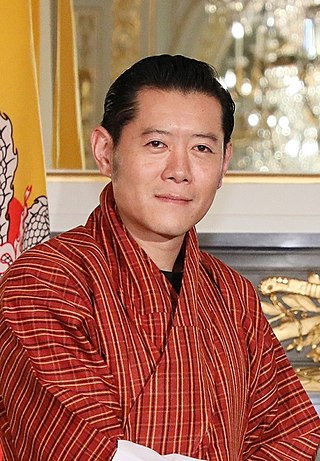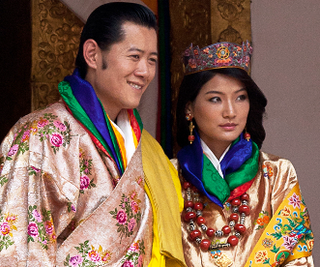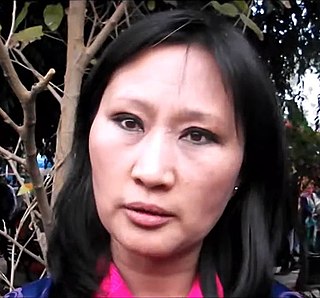Related Research Articles

Thimphu is the capital and largest city of Bhutan. It is situated in the western central part of Bhutan, and the surrounding valley is one of Bhutan's dzongkhags, the Thimphu District. The ancient capital city of Punakha was replaced by Thimphu as capital in 1955, and in 1961 Thimphu was declared as the capital of the Kingdom of Bhutan by the 3rd Druk Gyalpo Jigme Dorji Wangchuck.

Jigme Singye Wangchuck is a member of the House of Wangchuck who was the king of Bhutan from 1972 until his abdication in 2006.

Jigme Dorji Wangchuck was the 3rd Druk Gyalpo of Bhutan.

The Kingdom of Bhutan is divided into 20 districts. Bhutan is located between the Tibet Autonomous Region of China and India on the eastern slopes of the Himalayas in South Asia.
Articles related to Bhutan include:

Great Buddha Dordenma is a gigantic Shakyamuni Buddha statue in the mountains of Bhutan celebrating the 60th anniversary of fourth king Jigme Singye Wangchuck. The statue houses over one hundred thousand smaller Buddha statues, each of which, like the Great Buddha Dordenma itself, are made of bronze and gilded in gold. The Great Buddha Dordenma is sited amidst the ruins of Kuensel Phodrang, the palace of Sherab Wangchuk, the thirteenth Druk Desi, overlooking the southern approach to Thimphu, the capital of Bhutan. Construction began in 2006 and was planned to finish in October 2010, however construction did not conclude until 25 September 2015. The completed work is one of the largest Buddha rupas in the world, at 177 feet (54 m) and contains 100,000 8-inch-tall and 25,000 12-inch-tall gilded bronze Buddhas.

Jigme Khesar Namgyel Wangchuck is the King of Bhutan. His reign began in 2006 after his father Jigme Singye Wangchuck abdicated the throne. A public coronation ceremony was held on 6 November 2008, a year that marked 100 years of monarchy in Bhutan.

Changlimithang Stadium is a multi-purpose stadium in Thimphu, Bhutan, which serves as the national stadium of Bhutan. It is predominantly used for football matches and is the home of the Bhutan national football team, other national selections and a number of Thimphu-based football clubs. The stadium also regularly plays host to women's football, archery tournaments, minifootball and some volleyball matches. The stadium was initially constructed in 1974 for the coronation of the fourth King of Bhutan, Jigme Singye Wangchuck, but was completely refurbished in 2007 in advance of the coronation of Jigme Khesar Namgyel Wangchuck. Floodlights were added to the football pitch in 2009 and an evergreen turf laid in 2012, to coincide with the start of the first season of the National League. Located 2,300 meters (7,500 ft) above sea level, the stadium is one of the highest in the world. It has raised numerous controversies in footballing circles, as its significant altitude affects the absorption of oxygen in the human body, offering considerable advantage to the home teams who are more accustomed to such conditions.

Sangay Choden is one of the four wives and queens of Bhutanese king Jigme Singye Wangchuck, who ruled in Bhutan from 1972 until his abdication in 2006. She is the Queen Mother of Bhutan.
Wangchuk or Wangchuck is a given name and surname. Notable people with the name include:

The bilateral relations between the Kingdom of Bhutan and the Kingdom of Thailand were established in 1989. Thailand is one of the only 54 nations with formal diplomatic relations with Bhutan.
The Tobacco Control Act of Bhutan was enacted by the Parliament of Bhutan on 6 June 2010 and came into force on 16 June. It regulates tobacco and tobacco products, banning the cultivation, harvesting, production, and sale of tobacco and tobacco products in Bhutan. The act also mandates that the government of Bhutan provide counselling and treatment to facilitate tobacco cessation. Premised on the physical health and well being of the Bhutanese people – important elements of Gross National Happiness – the Tobacco Control Act recognizes the harmful effects of tobacco consumption and exposure to tobacco smoke on both spiritual and social health.
Public holidays in Bhutan consist of both national holidays and local festivals or tshechus. While national holidays are observed throughout Bhutan, tsechus are only observed in their areas. Bhutan uses its own calendar, a variant of the lunisolar Tibetan calendar. Because it is a lunisolar calendar, dates of some national holidays and most tshechus change from year to year. For example, the new year, Losar, generally falls between February and March.

The wedding of Jigme Khesar Namgyel Wangchuck, King of Bhutan, and Jetsun Pema took place on 13 October 2011 at the Punakha Dzong in Punakha, Bhutan. The current King of Bhutan, Jigme Khesar Namgyel Wangchuck, married Jetsun Pema, who became Queen Ashi Jetsun Pema Wangchuck. Both are descendants of the 48th Druk Desi of Bhutan and 10th Penlop of Trongsa, Jigme Namgyal.
HIV/AIDS in Bhutan remains a relatively rare disease among its population. It has, however, grown into an issue of national concern since Bhutan's first reported case in 1993. Despite preemptive education and counseling efforts, the number of reported HIV/AIDS cases has climbed since the early 1990s. This prompted increased government efforts to confront the spread of the disease through mainstreaming sexually transmitted disease (STD) and HIV prevention, grassroots education, and the personal involvement of the Bhutanese royal family in the person of Queen Mother Sangay Choden.

Among Bhutan's most pressing environmental issues are traditional firewood collection, crop and flock protection, and waste disposal, as well as modern concerns such as industrial pollution, wildlife conservation, and climate change that threaten Bhutan's population and biodiversity. Land and water use have also become matters of environmental concern in both rural and urban settings. In addition to these general issues, others such as landfill availability and air and noise pollution are particularly prevalent in relatively urbanized and industrialized areas of Bhutan. In many cases, the least financially and politically empowered find themselves the most affected by environmental issues.

The Jigme Dorji Wangchuk Memorial Gold Cup is an international football club tournament held in Bhutan. The inaugural edition was held in 2004, replacing the Federation Cup which was last played in 2002, which in turn has its origin traces back to its original name Jigme Dorji Wangchuck Memorial Gold Cup of the 1990s. The rebranded Jigme Dorji Wangchuck Memorial Gold Cup was revived in 2019.

Lily Wangchuk or Lily Wangchhuk is a Bhutanese politician, diplomat and activist. A diplomat between 1994 and 2008, in November 2012 she became the first Bhutanese woman to be appointed president of a political party.

The Bhutan Centre for Media and Democracy (BCMD) is the first Civil Society Organisation in Bhutan. It was launched in 2008 coinciding with the country's first government elections, which heralded a new era of self-governance following the abdication of the fourth king of Bhutan, Jigme Singye Wangchuck. At the same time, the media landscape saw the arrival of new private newspapers and radio stations, as well as social media via mobile telephones and the Internet. The stated mission of BCMD is to "nurture democracy in Bhutan through civic engagement, public discourse and media literate citizens".

Dasho Dr. Lotay Tshering is a Bhutanese politician and surgeon who was the prime minister of Bhutan, in office from 7 November 2018 to 1 November 2023. He has also been the president of Druk Nyamrup Tshogpa since 14 May 2018.
References
- ↑ "Themantic Group - CSOA". www.csoa.org.bt. Retrieved 2023-10-12.
- ↑ "About BMF". Bhutan Media Foundation. 2018-10-23. Retrieved 2023-10-12.
- 1 2 Dorji, Minjur (2012-06-13). "Bhutanese media lacks professional and technical capacity". The Bhutanese. Retrieved 2023-10-13.
- 1 2 3 Zylinski, Szymon (2017). "The Role of Bhutan Media Foundation in Fostering Free Media in Bhutan". The Changing Role of Asia: Selected Cultural and Educational Aspects (PDF). Wydawnictwo Adam Marszalek. pp. 59–76. ISBN 978-83-8019-641-4.
- ↑ "BMF Team". Bhutan Media Foundation. 2018-10-23. Retrieved 2023-10-12.
- ↑ Dema, King (2015-12-14). "Guideline for sensitive reporting on women and children". Kuensel. Retrieved 2023-10-13.
- ↑ Dema, Choni (2021-11-18). "BMF launches toolkit to tackle misinformation online". Bhutan Broadcasting Service. Retrieved 2023-10-13.
- ↑ "A Silver Lining, Editorial". Bhutan Today. 26 March 2011.
- ↑ Zangpo, Needrup (2013-09-30). "Bhutan Media Foundation and Sherubtse sign MoU". Bhutan Observer. Archived from the original on 2017-12-20.
- ↑ "BMF and partners launch forum for environmental journalists". Bhutan Observer. 2013-10-18. Archived from the original on 2017-12-20.
- 1 2 Zangmo, Tanden (2017-07-01). "BMF launches Apps, websites". The Bhutanese. Retrieved 2023-10-12.
- ↑ "Perils of Fake News". Kuensel. 2023-05-16. Retrieved 2023-10-12.
- ↑ Norbu, Namkhai (2022-06-16). "Education and awareness recommended to address ills of social media in Bhutan". Business Bhutan. Retrieved 2023-10-13.
- ↑ Dendup, Tshering (2021-05-07). "A Bhutanese spends nearly 3 hours on social media every day, says study". Bhutan Broadcasting Service. Retrieved 2023-10-13.
- ↑ "A new hope for Bhutanese media". Kuensel. 2023-07-12. Retrieved 2023-10-12.
- ↑ Wangchuk, Jigme (2023-07-12). "Thimphu Press Club: Fostering growing democracy and intellectual hub". Kuensel. Retrieved 2023-10-12.